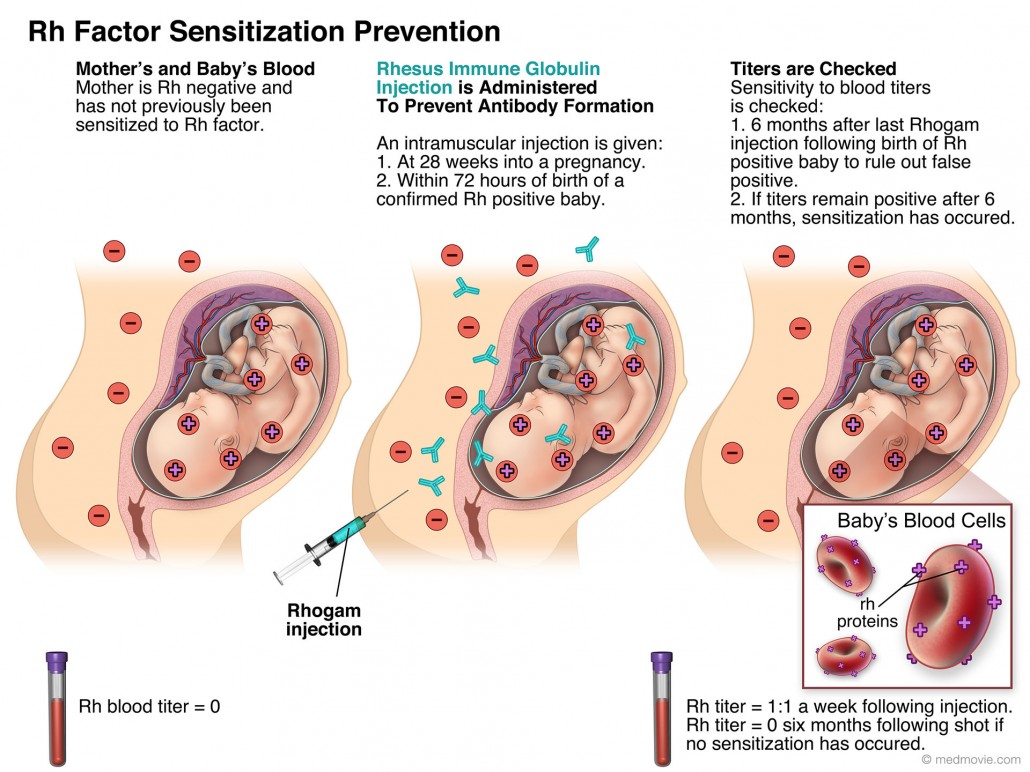
Rh sensitization can occur during pregnancy if you are Rh-negative and pregnant with a developing baby who has Rh-positive blood.

What causes Rh sensitization, and what problems does it cause? A blood test is the only way to know you have it or are at risk for it. Rh sensitization during pregnancy doesn't cause any warning symptoms. But in future pregnancies, sensitization could cause problems. In most cases, this isn't a problem the first time you're pregnant. If the two types of blood mix, your body will make antibodies.

You may have Rh-negative blood, and your baby may have Rh-positive blood. The baby may then need a red blood cell transfusion while in the womb or soon after birth.Condition Basics What is Rh sensitization during pregnancy? If blood type inheritance from parent to child occurs Rh incompatibility in first pregnancy and Rh factor incompatibility in second and subsequent pregnancies, antibodies made in the mother's body can damage the baby's red blood cells. But it can cause problems in subsequent pregnancies, especially if the baby has Rh+ blood type. These antibodies will not cause problems for a baby with Rh+ blood type in the first pregnancy. So, if there is an Rh incompatibility, then the mother's body can make Rh antibodies to fight the Rh factor. Although maternal and fetal blood usually do not mix during pregnancy, a minimal amount of maternal and infant blood can come into contact during delivery. If the doctor determines that the blood type is passed from parent to child with possible Rh factor incompatibility, the mother needs to be closely monitored during pregnancy and may even require extra care. It also means that the child has Rh+ blood type.

If you have Rh- blood type, your doctor will order the blood test again at your next prenatal visit to check for antibodies against Rh that have formed in your body. So at your first prenatal visit, your doctor always recommends a blood type and Rh factor screening test. This phenomenon is called blood type incompatibility between mother and child. Because the blood cells from the Rh+ baby will follow the Rh- mother's blood stream to trigger the mother's immune response to form antibodies that attack the baby's Rh+ red blood cells. If the mother's blood type is Rh- but the blood type inheritance from parent to child is Rh+, it should be considered. Rh+ or Rh- usually doesn't affect health but can affect pregnancy. Rh factor is an inherited protein, so passing on blood type from parent to child will determine Rh+ or Rh-, but the most common is Rh+. If the red blood cells have antigens, it is Rh positive or Rh+, otherwise it is Rh. This is another antigen found on red blood cells.

2.2 Inheritance of blood type from parent to child - Rh factor Blood is also measured according to the Rh factor. Or both parents have blood type A or B but can still give birth to a child with type O blood if the child carries the O gene. So, if you inherit O from one parent and A from the other, your child's blood type will be A. On the other hand, O blood type doesn't contain any antigens and doesn't affect A and B blood types. Or it is also possible to get B antigens from both parents and make BB or B blood type. 2.1 Inheritance of blood type from parent to child - ABO system With the ABO system, one person can inherit gene A from one parent and gene B from the other, resulting in blood type AB. Therefore, blood groups of parents and children are closely related. Each person inherits genes from their parents, one from their mother and one from their father - to create a pair.


 0 kommentar(er)
0 kommentar(er)
